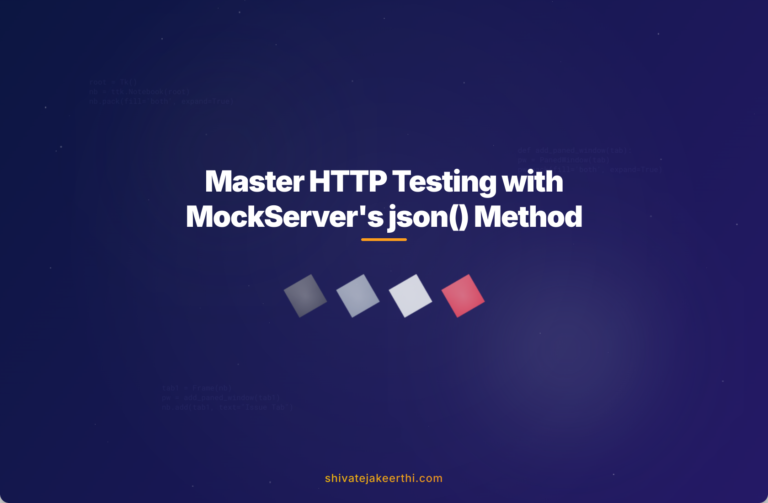MockServer is a versatile tool that helps developers easily mock HTTP interactions during integration testing. It eradicates dependencies on external services by simulating how servers respond to various requests, making testing faster and simpler.
Among its many handy features, the json() method stands out. It helps developers define precise ways of matching JSON request payloads. In this guide, we’ll explore everything you need to understand about this JSON-matching feature, starting from its import location to advanced usage scenarios.
Understanding the json() Method in MockServer
At its core, the json() method lets developers define and match specific JSON payload structures and content in incoming HTTP requests. Rather than manually parsing payload data, you simply define a JSON example, and MockServer does the rest.
Functionality of json()
The json() matcher simplifies the handling of JSON payloads during testing. You pass a JSON structure or a JavaScript object, and MockServer matches the incoming request payload against it.
Parameters of json()
The basic syntax of json() usually looks something like this:
mockServerClient
.when(
request()
.withMethod("POST")
.withPath("/submit")
.withBody(json({ key: "value" }))
)
.respond(response().withStatusCode(200));
You can learn more about request matching basics on the official MockServer documentation.
Where to Import MockServer’s json() Method
To use the json() method, import it from MockServer’s client library. A typical import statement looks like:
const { mockServerClient, json } = require('mockserver-client');
This import statement allows you to seamlessly use json() alongside other MockServer client functions. Notice that both the ‘mockServerClient’ and ‘json’ matcher are imported together from the ‘mockserver-client’ package available on NPM. For more details, visit MockServer’s NPM page.
Practical Usage: Examples of How to Use json() in MockServer
Using the json() matcher is straightforward. Suppose your server expects a POST request with a user registration JSON payload. You might set up a matching scenario like this:
mockServerClient("localhost", 1080)
.when(
request()
.withMethod("POST")
.withPath("/register")
.withBody(json({
username: "test_user",
password: "secure_password"
}))
)
.respond(response()
.withStatusCode(201)
.withBody("User created successfully"));
This ensures that MockServer only returns the specified response when the JSON payload matches exactly.
Advanced Usage: MatchType Parameter
Beyond basic matching, MockServer’s json() method supports a helpful MatchType parameter. This optional parameter specifies how strictly the JSON must match.
There are two primary matching modes provided by MatchType:
- STRICT: requires the exact same JSON structure and content.
- ONLY_MATCHING_FIELDS (Lenient): allows a partial match, where only specified fields are required to match.
Here’s an example demonstrating lenient matching:
const { MatchType } = require('mockserver-client');
mockServerClient("localhost", 1080)
.when(
request()
.withMethod("POST")
.withPath("/profile")
.withBody(json(
{
name: "John Doe"
},
MatchType.ONLY_MATCHING_FIELDS
))
)
.respond(response()
.withStatusCode(200));
In this scenario, the request matches even if additional fields exist, as long as the “name” field is correctly matched.
Why Choose json() Over Other Request Matchers?
Compared to regex or plain string matching, JSON matching provides several critical benefits:
- Accuracy: matches specific JSON keys and values precisely.
- Ease of maintenance: readable, intuitive, and easy to update.
However, it’s also important to understand its limitations:
- Sensitive to formatting: using STRICT matching requires exact matches.
- Complex nesting can get confusing: deep-nested JSON structures may become harder to debug or match accurately.
If you’re confused between JSON and other request matching methods, this excellent JavaScript article collection can provide additional insights.
Best Practices for Implementing json() Matcher
When using MockServer JSON matching, be mindful of a few best practices to optimize performance and reduce errors:
- Use Lenient Matching: whenever precise accuracy isn’t needed, lenient matching saves time.
- Validate Incoming Requests: make sure the JSON sent from your tests is well-formed before troubleshooting match failures.
- Minimize complexity: keep JSON structures simple and avoid too much nesting unless necessary.
Real-World Use Cases for json() Matcher
The json() matcher is perfect when API endpoints use structured JSON payloads. Typical scenarios in real-world testing include:
- User Authentication and Registration: matching specific user details to ensure accurate responses.
- Shopping Cart APIs: confirming correct payload structure when adding items or checking out.
- IoT Device Communication: precise matching of sensor data payloads for validations.
Troubleshooting Common json() Issues and FAQs
Here are some common problems developers face when using the json() matcher and how to overcome them:
- Exact Matching Failures: Ensure you’re using the appropriate MatchType. Switch to lenient matching if exact matching isn’t practical.
- Unable to Import: check your dependency installation. Running
npm install mockserver-clientusually fixes import issues. - Unexpected Matching Results: Check the exact JSON structures you’re sending. Compare payloads carefully, and try using JSON validators like JSONLint.
If still unsure, consider posting your issue clearly explained on community platforms like Stack Overflow.
MockServer’s json() method significantly simplifies handling JSON payload matching, making your integration and API tests more robust. Its clear syntax, configurable match types, and intuitive usage reduce overhead and improve test reliability.
Ready to improve your API testing with MockServer? Try the json() matcher today and experience simpler, more efficient testing workflows. And if you’ve already used it, how has it impacted your testing strategy? Would love to hear your experiences!



0 Comments